L'Olimpiade, Irish National Opera review - Vivaldi's long-distance run sustained by perfect teamwork | reviews, news & interviews
L'Olimpiade, Irish National Opera review - Vivaldi's long-distance run sustained by perfect teamwork
L'Olimpiade, Irish National Opera review - Vivaldi's long-distance run sustained by perfect teamwork
Sporting confusions and star-crossed lovers clarified by vivacious singing and playing
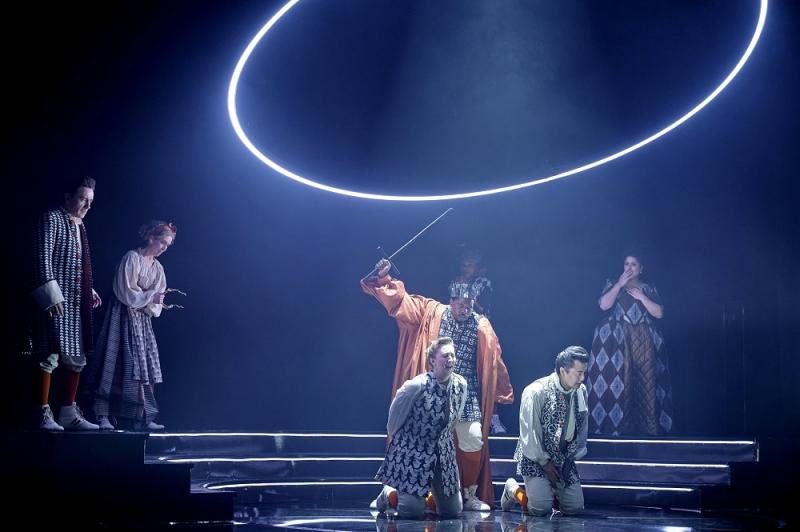
In Vivaldi’s more extravagant operas, some of the arias can seem like a competition for the gold medal. L’Olimpiade is relatively modest in most of its demands, with one notable exception, and Irish National Opera’s track record in exemplary casting across the board gave us a relay race from an ideal team, keeping the work’s trajectory from modest introductions to greater depth and fire in the set pieces stylishly on course.
The guiding hands are Peter Whelan’s both on the harpsichord, in crucial recitativo secco dialogue with the inventiveness of Pablo FitzGerald on archlute. So they were in Bajazet, Irish National Opera’s second Vivaldi staging, which introduced London audiences to the vivacious miracle of a 10-piece Irish Baroque Orchestra (pictured below with the seven singers of L'Olimpiade), stealing much of the show from what happened on stage, and winning the 2022 Olivier Award for Outstanding Achievement in Opera. 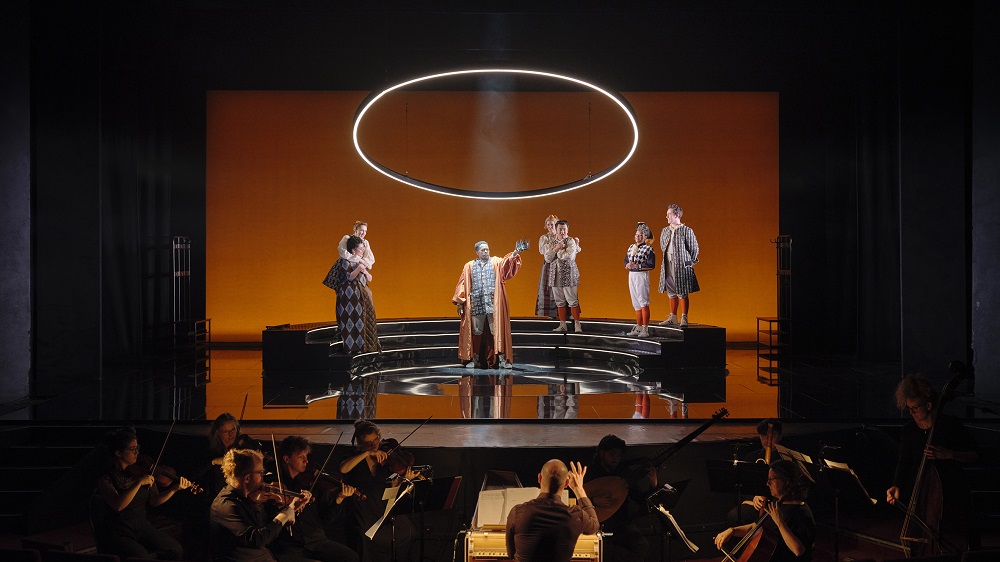 This time the honours are absolutely equal, though it is surely Whelan’s doing to get Chinese countertenor Meili Li and South African baritone Chuma Sijeqa – whose stock regent Vivaldi lends unexpected depth at the last minute – to sing as softly as the strings play in what are arguably L’Olimpiade’s deepest numbers.
This time the honours are absolutely equal, though it is surely Whelan’s doing to get Chinese countertenor Meili Li and South African baritone Chuma Sijeqa – whose stock regent Vivaldi lends unexpected depth at the last minute – to sing as softly as the strings play in what are arguably L’Olimpiade’s deepest numbers.
I wonder if all Dubliners realized how lucky they were to be on such intimate terms with a world-class team in Dún Laoghaire’s 324-seater Pavilion Theatre. The Linbury's acoustics will be less harsh on instrumental sound. This time round, everything works for a perfect touring opera. Molly O’Cathain’s designs, Jake Wiltshire’s lighting and Matthew Forbes’s movement are in perfect harmony with the concept of director Daisy Evans (not to be underestimated, either, is the Italian coaching of Annalisa Monticelli, since meaning and expression are uniformly fine). Framing what plot twists there, Evans presents us with a kind of Olympic team trained by Rachel Redmond’s feisty Aminta (pictured below with the rest of the cast). 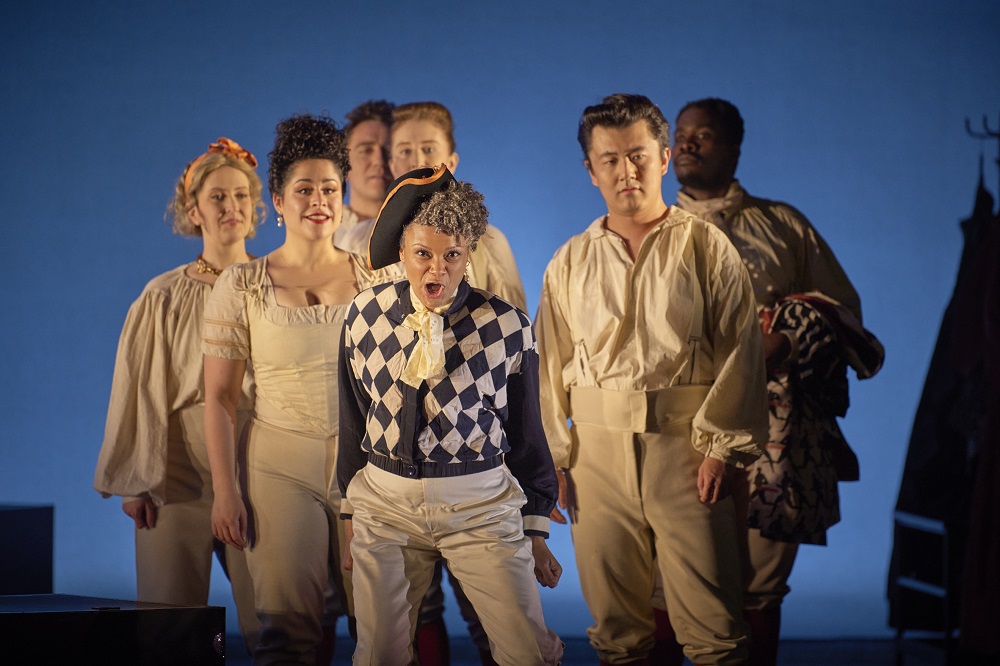 That keeps the seven hard-working principals on stage for most of the time – and pushing around the two segments of amphitheatre in a mini-revolve circle – before they step in to the roles and costumes of their characters.The construction of how Vivaldi deals with the frequently-used Metastasio libretto and its stock nature similes means that the race in which Licida gets his friend Megacle to participate as himself – in other words wearing a shirt with a giant L on it here – and win Princess Aristea is over at the end of the first half, while the second (part of Vivaldi’s Act Two and the whole of Act Three) takes up the emotions the composer has made suddenly real in Licida’s second aria and the hypnotic duet with Aristea.
That keeps the seven hard-working principals on stage for most of the time – and pushing around the two segments of amphitheatre in a mini-revolve circle – before they step in to the roles and costumes of their characters.The construction of how Vivaldi deals with the frequently-used Metastasio libretto and its stock nature similes means that the race in which Licida gets his friend Megacle to participate as himself – in other words wearing a shirt with a giant L on it here – and win Princess Aristea is over at the end of the first half, while the second (part of Vivaldi’s Act Two and the whole of Act Three) takes up the emotions the composer has made suddenly real in Licida’s second aria and the hypnotic duet with Aristea.
There are convolutions involving two pairs of sundered lovers, and a reconciliation scene which almost outdoes Shakespeare’s Cymbeline in its “I was that toothbrush” revelations. We know there’ll be a happy ending, but the moments of potential tragedy are taken seriously and the stage pictures are carefully composed and beautifully lit to underline that. 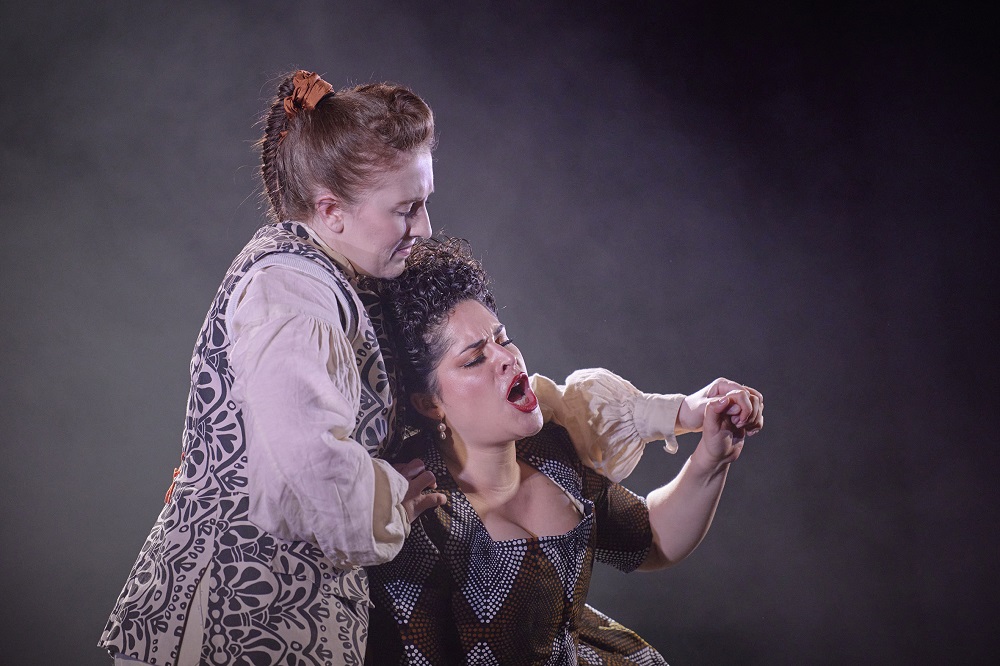 While Vivaldi’s energy is all his own from the start, with one double-bass (the magnificent Rosie Moon) underpinning all the tempests and fires of the heart, the first stretch is a parade of what Whelan in the programme interview calls “vanilla music” before you’re truly drawn in. Li is now a fully accomplished singer-actor, stepping up from his uneven performance as Gluck’s Orfeo at the 2022 Blackwater Festival. You wish Gemma Ní Bhriain, utterly committed and lustrously focused as long-suffering Megacle (pictured above with Alexandra Urquiola's Aristea), got a truly resplendent aria to match Licida’s; her/his deeper expressions reside in some very interesting recitativo accompagnato.
While Vivaldi’s energy is all his own from the start, with one double-bass (the magnificent Rosie Moon) underpinning all the tempests and fires of the heart, the first stretch is a parade of what Whelan in the programme interview calls “vanilla music” before you’re truly drawn in. Li is now a fully accomplished singer-actor, stepping up from his uneven performance as Gluck’s Orfeo at the 2022 Blackwater Festival. You wish Gemma Ní Bhriain, utterly committed and lustrously focused as long-suffering Megacle (pictured above with Alexandra Urquiola's Aristea), got a truly resplendent aria to match Licida’s; her/his deeper expressions reside in some very interesting recitativo accompagnato.
Unusually Megacle’s love goes lower than he does; this is a fire-breathing, virtuoso and commanding performance from Cuban-American Alexandra Urquiola. Redmond delivers her showpiece with maximum aplomb; Sarah Richmond, the third of the mezzos, holds her own as Aristea’s confidante and Licida’s seemingly discarded lover Argene (pictured below with Li's Licida) and Seán Boylan makes a late impression as the king’s henchman, in the second half getting what might seem like a Sturm und Drang aria well ahead of its time, but one that in fact fits well with Vivaldi’s more tempestuous armoury. 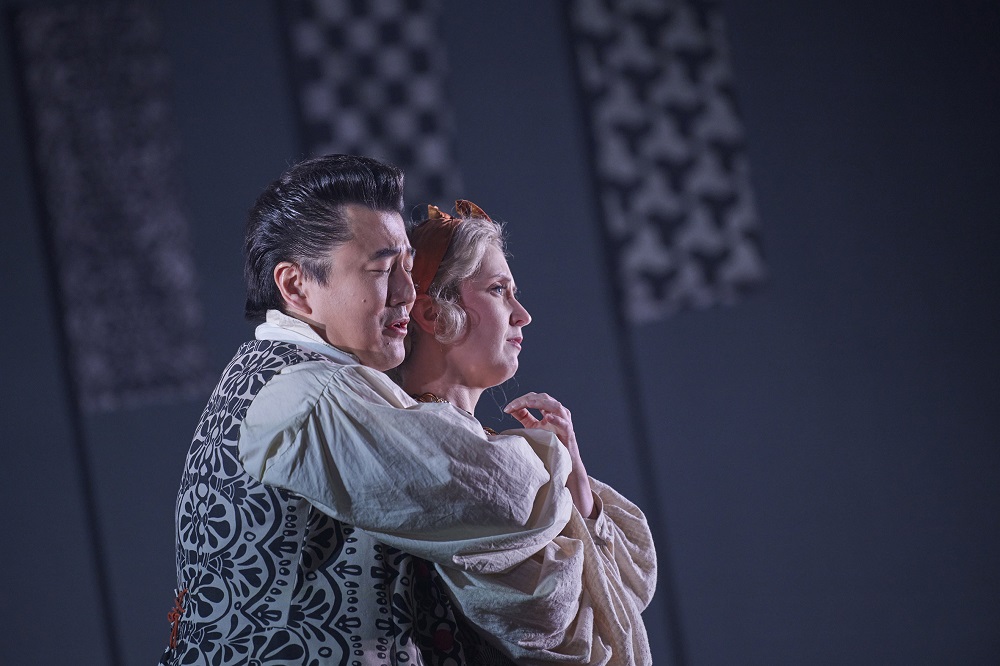 You’d have to know the original score well to appreciate what’s been done to buff it up and move it along here. Presumably there would be no visible context for the games without an attendant musical number (update: I discovered this was one of several less obvious borrowings from Vivaldi concertos). What we can glean from the programme – it would have been nice to know which roles were originally taken by soprano castrati (surprisingly enough, those sung here by soprano Redmond and mezzo Ní Bhriain) – is that a 1939 revival reworked by Virgilio Mortari introduced music from Vivaldi’s Dorilla in Tempe, which itself had recycled part of the “Spring” concerto from The Four Seasons; it pops up here. Whatever the sources, the final credits must go to Whelan for making sure the whole potentially unwieldy thing never sags, but also never barrels forwards too relentlessly, and to the uniformly compelling performances he and Evans draw from their superb singers.
You’d have to know the original score well to appreciate what’s been done to buff it up and move it along here. Presumably there would be no visible context for the games without an attendant musical number (update: I discovered this was one of several less obvious borrowings from Vivaldi concertos). What we can glean from the programme – it would have been nice to know which roles were originally taken by soprano castrati (surprisingly enough, those sung here by soprano Redmond and mezzo Ní Bhriain) – is that a 1939 revival reworked by Virgilio Mortari introduced music from Vivaldi’s Dorilla in Tempe, which itself had recycled part of the “Spring” concerto from The Four Seasons; it pops up here. Whatever the sources, the final credits must go to Whelan for making sure the whole potentially unwieldy thing never sags, but also never barrels forwards too relentlessly, and to the uniformly compelling performances he and Evans draw from their superb singers.
- One more performance at the Pavilion Theatre, Dún Laoghaire on 7 May (returns only), then touring to Maynooth (9 May), the Royal Opera House's Linbury Theatre (15-25 May, returns only) and Fribourg, Switzerland (29 May-1 June)
- Future performances to be recorded for broadcast on BBC Radio 3
- More opera reviews on theartsdesk
Add comment
The future of Arts Journalism
You can stop theartsdesk.com closing!
We urgently need financing to survive. Our fundraising drive has thus far raised £49,000 but we need to reach £100,000 or we will be forced to close. Please contribute here: https://gofund.me/c3f6033d
And if you can forward this information to anyone who might assist, we’d be grateful.

Subscribe to theartsdesk.com
Thank you for continuing to read our work on theartsdesk.com. For unlimited access to every article in its entirety, including our archive of more than 15,000 pieces, we're asking for £5 per month or £40 per year. We feel it's a very good deal, and hope you do too.
To take a subscription now simply click here.
And if you're looking for that extra gift for a friend or family member, why not treat them to a theartsdesk.com gift subscription?
more Opera
 La bohème, Opera North review - still young at 32
Love and separation, ecstasy and heartbreak, in masterfully updated Puccini
La bohème, Opera North review - still young at 32
Love and separation, ecstasy and heartbreak, in masterfully updated Puccini
 Albert Herring, English National Opera review - a great comedy with depths fully realised
Britten’s delight was never made for the Coliseum, but it works on its first outing there
Albert Herring, English National Opera review - a great comedy with depths fully realised
Britten’s delight was never made for the Coliseum, but it works on its first outing there
 Carmen, English National Opera review - not quite dangerous
Hopes for Niamh O’Sullivan only partly fulfilled, though much good singing throughout
Carmen, English National Opera review - not quite dangerous
Hopes for Niamh O’Sullivan only partly fulfilled, though much good singing throughout
 Giustino, Linbury Theatre review - a stylish account of a slight opera
Gods, mortals and monsters do battle in Handel's charming drama
Giustino, Linbury Theatre review - a stylish account of a slight opera
Gods, mortals and monsters do battle in Handel's charming drama
 Susanna, Opera North review - hybrid staging of a Handel oratorio
Dance and signing complement outstanding singing in a story of virtue rewarded
Susanna, Opera North review - hybrid staging of a Handel oratorio
Dance and signing complement outstanding singing in a story of virtue rewarded
 Ariodante, Opéra Garnier, Paris review - a blast of Baroque beauty
A near-perfect night at the opera
Ariodante, Opéra Garnier, Paris review - a blast of Baroque beauty
A near-perfect night at the opera
 Cinderella/La Cenerentola, English National Opera review - the truth behind the tinsel
Appealing performances cut through hyperactive stagecraft
Cinderella/La Cenerentola, English National Opera review - the truth behind the tinsel
Appealing performances cut through hyperactive stagecraft
 Tosca, Royal Opera review - Ailyn Pérez steps in as the most vivid of divas
Jakub Hrůša’s multicoloured Puccini last night found a soprano to match
Tosca, Royal Opera review - Ailyn Pérez steps in as the most vivid of divas
Jakub Hrůša’s multicoloured Puccini last night found a soprano to match
 Tosca, Welsh National Opera review - a great company reduced to brilliance
The old warhorse made special by the basics
Tosca, Welsh National Opera review - a great company reduced to brilliance
The old warhorse made special by the basics
 BBC Proms: The Marriage of Figaro, Glyndebourne Festival review - merriment and menace
Strong Proms transfer for a robust and affecting show
BBC Proms: The Marriage of Figaro, Glyndebourne Festival review - merriment and menace
Strong Proms transfer for a robust and affecting show
 BBC Proms: Suor Angelica, LSO, Pappano review - earthly passion, heavenly grief
A Sister to remember blesses Puccini's convent tragedy
BBC Proms: Suor Angelica, LSO, Pappano review - earthly passion, heavenly grief
A Sister to remember blesses Puccini's convent tragedy
 Orpheus and Eurydice, Opera Queensland/SCO, Edinburgh International Festival 2025 review - dazzling, but distracting
Eye-popping acrobatics don’t always assist in Gluck’s quest for operatic truth
Orpheus and Eurydice, Opera Queensland/SCO, Edinburgh International Festival 2025 review - dazzling, but distracting
Eye-popping acrobatics don’t always assist in Gluck’s quest for operatic truth

Comments
Thank you David, this is very